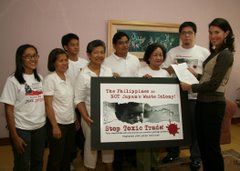31 August 2007
To the Editor:
I write in reaction to your editorial yesterday, 30 August 2007, in which you wrote glowingly about the benefits which the Philippines reportedly stands to gain under the Japan-Philippines Economic Partnership Agreement (JPEPA).
I have been studying the actual text of the JPEPA since September 2006, immediately after the Philippine government made it available to the public. Far from being mere paranoia, the dangers of JPEPA that have been raised by civil society and the basic sectors are very real indeed.
In theory, countries are supposed to mutually benefit under free trade and bilateral investment treaties such as the JPEPA. These supposed benefits are reflected in the economic projections made before such treaties are negotiated or completed. However, the real gains can only be assessed in the light of the actual final negotiated text of the treaty, the specific concessions and reservations made in the annexes, and the political, social, and economic reality within which the treaty will operate.
While there is no express provision saying that Japan will export its waste to the Philippines, this is due more to the sophistication of the Japanese negotiators than anything else. Articles 29 (i) to (l) of JPEPA subtly provide that goods that are “fit only for disposal” can be traded under preferential tariff rates. Annex 1 of JPEPA expressly provides that clinical waste, municipal waste, sewage sludge, and incinerator ash can enter the Philippines duty-free. The DENR and members of civil society already pointed out as early as February 2006 that this would potentially violate Philippine environmental law and the Basel Convention, but our negotiators inexplicably ignored this piece of legal advice.
More than the loss of tariff revenue, what the Senators must be even more alarmed about is the loss of policy space and national sovereignty that JPEPA will wreak at both the national and local government levels.
First, by eliminating tariffs on practically all products, the Executive Branch has usurped the power of Congress to adjust tariffs and impose quotas, and eliminated the use of tariffs as a means to shape trade and industrial policy in furtherance of national development goals.
Worse, under the investments chapter of JPEPA (Chapter 8, Articles 87-107 and Annex 7), our negotiators effectively bargained away the prerogative of the national and local governments to enact and enforce future laws and policies pertaining to investment and taxation. This can be seen from the glaring absence of any Philippine reservation of “the right to adopt or maintain any future measures” at both the national and local government levels. This means that, if in the future Congress or an LGU enacts a measure that threatens the profit margin of Japanese investors, investors can claim that such a law or ordinance is tantamount to expropriation, and can demand compensation before an international arbitral tribunal, such as what happened in the Fraport-Terminal III case. Even a cursory examination of the experiences of Canada and Mexico under the NAFTA will show that this scenario is not far-fetched at all.
The supposed market access gains under the JPEPA are belied by the reality of the concessions that the Philippines has managed to exact from Japan. Anyone who will take the time to review the JPEPA tariff schedule will see that Japan has excluded 238 key products from tariff reduction, and has imposed quotas on key Philippine imports such as Cavendish bananas.
Moreover, the Philippines has excluded only rice and salt from tariff elimination, a move which our negotiators have justified as necessary for compliance with WTO commitments. This does not explain how Indonesia managed to exclude 835 products, including iron and steel, poultry, livestock, and various fruits, or how Malaysia was able to exclude 38 products, including rubber, wheat, rice, sugar, meat and dairy products. In addition to that, Malaysia has provided for a maximum 15-year period for tariff reduction, compared to the Philippines’ maximum period of 10 years.
These matters are just a few of the many legitimate causes for concern over the possible Senate approval of the JPEPA. The Senate must not be swayed by the hype and euphoria of promised Japanese investments and official development assistance, but must critically analyze the JPEPA and recognize this treaty for what it truly is: a lopsided agreement that sacrifices the future of the Philippines and the Filipino people at the altar of Japanese government and business interests.
The Manila Times has had a long and celebrated history of coming out with balanced news and well-reasoned editorials. It saddens me to note that your JPEPA editorial appears to have been based solely on government press releases and speculations without the benefit of actual, independent study. It would be best that your editorial pieces be backed by empirical data and critical analysis, lest your paper’s credibility be called into question in the future.
Very truly yours,
Tanya Lat
LL.M. Candidate, 2007-2008
Fellow, Institute of International Economic Law
Georgetown University Law Center
Washington, D.C.
Read the Manila Times editorial here.
Subscribe to:
Post Comments (Atom)






1 comment:
I feel sad about the provisions of JPEPA. It seems like the agreement only favors Japan and I don't like the provision that they will send their waste products here in the Philippines for free. Hell no! Even if they will pay money for it, it still unacceptable for me. By the way, for best attorney manila, visit: http://ndvlaw.com/.
Post a Comment